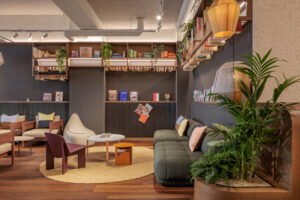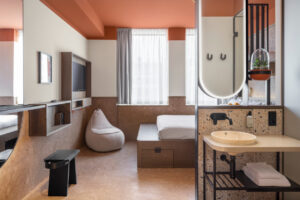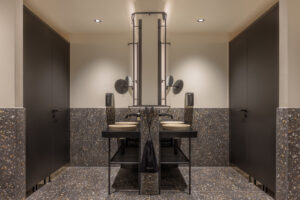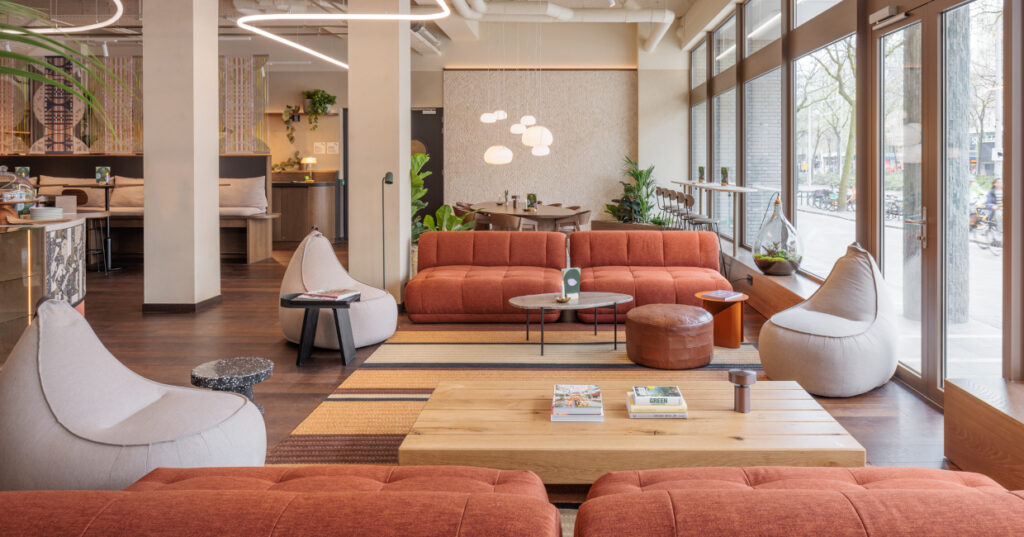The Usual Rotterdam brings to life interior architect JOI-Design’s creative vision for a fresh approach to travel through conscious ways of sleeping, eating and interaction.
The new hotel brand is all about positive impact: biophilic FF&E designed with circular recyclability; water-saving solutions; and community-strengthening initiatives.
Backed by Crossroads Real Estate, The Usual’s founders comprise non-traditional hospitality experts who believe in new ways of travelling and hospitality. They briefed JOI-Design to create the Rotterdam flagship as a celebration of regenerative hospitality and the values of globally minded travellers who prioritise ESG (Environmental, Social and Governance) principles: benchmarks for measuring a business’ transparency and accountability when impacting society and the environment. The studio’s meticulous research also established brand guidelines for future retrofits as The Usual brand rolls out into other markets. The concept was created so that, in addition a core hotel offering, each destination can include options from a menu of ‘add-on’ guest experiences that best suit its distinct location, building size, and community needs. The Rotterdam property incorporates them all.
 With the aim of making conscious travel customary and a force for good, ESG and UN Sustainable Development Goals guided every design decision. The Usual is powered by 100% renewable energy from Dutch windmills. Already Green Key certified, forthcoming accreditation includes BREEAM In-Use assessment of either ‘Excellent’ or, amongst the first for European hotels, ‘Outstanding’, plus application for B-Corp status once there’s enough operational data.
With the aim of making conscious travel customary and a force for good, ESG and UN Sustainable Development Goals guided every design decision. The Usual is powered by 100% renewable energy from Dutch windmills. Already Green Key certified, forthcoming accreditation includes BREEAM In-Use assessment of either ‘Excellent’ or, amongst the first for European hotels, ‘Outstanding’, plus application for B-Corp status once there’s enough operational data.
JOI-Design chose materials proven to have lower environmental impacts and longer lifespans: either bio-based; recyclable; made from recycled components; or reusable at the end of their lives, and therefore in alignment with the values of the circular economy. In addition, the team looked at social aspects by taking into consideration production locations and working conditions. For full transparency, companies specified were asked to provide details about their ESG-related practices.
The 209 accommodations comprise three price categories attracting a cross-section of guests. Inspired by Japanese capsule hotels, the 40 green-hued and OSB-clad ‘Pod’ rooms are private yet share bathrooms and, at 4, 6 or 8 sqm, contain solely twin or double-beds.
 The 150 terracotta-toned ensuite guestrooms come in two types: ‘Cosy’, at 14 sqm, and ‘Usual’, ranging from 17-30 sqm. They feature cork walls and ceramic terrazzo tiles, mini microclimate terrariums, and safes built into bed bases; some rooms have internal balconies for additional sleeping space. Each of the 19 ochre-coloured long-stay ‘Studios’ includes a double bed, a seating area with a sleeper sofa, and a kitchenette including a four-person dining table within a 30 sqm footprint.
The 150 terracotta-toned ensuite guestrooms come in two types: ‘Cosy’, at 14 sqm, and ‘Usual’, ranging from 17-30 sqm. They feature cork walls and ceramic terrazzo tiles, mini microclimate terrariums, and safes built into bed bases; some rooms have internal balconies for additional sleeping space. Each of the 19 ochre-coloured long-stay ‘Studios’ includes a double bed, a seating area with a sleeper sofa, and a kitchenette including a four-person dining table within a 30 sqm footprint.
Every ensuite bathroom has a woodchip basin with waterproof resin binders, and in each Cosy room, a rotating door encloses either the toilet or the shower to add spaciousness yet maintain privacy.
All mattresses are designed for circularity; timber furniture has a base of primarily recycled woodchips from FSC Certified managed forests; and lighting is 100% LED. Signature designs include wall shelves that unfold to become desks; stools with U-shaped handles; and U-shaped mirrors and robe hooks. Custom ‘raindrop’-shaped beanbag chairs in recycled-content upholstery subtly reinforce the water conservation theme.
 The lobby harmonises with the neighbourhood‘s vibe, encouraging locals to interact with travellers. Greenery, river stone tiles, and earth-toned natural materials instil the relaxation of a cosy lounge, while self-check-in at the rear makes things less ‘hotel-like’.
The lobby harmonises with the neighbourhood‘s vibe, encouraging locals to interact with travellers. Greenery, river stone tiles, and earth-toned natural materials instil the relaxation of a cosy lounge, while self-check-in at the rear makes things less ‘hotel-like’.
The U Bar has a self-serve tap-water station and mosaic cladding formed from the hotel’s terrazzo tile offcuts. Bar tables are made from timber remnant terrazzo composite, while barstools’ moulded seats mix waste from recycled plastic and coffee beans. Upcycled flea-market-finds introduce local history and soul. Books hung from shelves around the library’s perimeter offer entertainment.
In the Game Room is a giant ’Scrabble’ wall and, next to the ping-pong/community table, an oversized ‘Connect Four’ game that doubles as a divider screen for the gaming area. An upholstered folding door slides in front of the TV to become wall art when the screen is not in use.
Around 70% of the primarily vegan and vegetarian F&B is produced by like-minded neighbourhood companies, thereby supporting the local economy and reducing transportation emissions. The brand’s in-house sustainability team sought the advice of local city ecologists to stimulate biodiversity, and in response installed bird houses, green roofs and insect hotels. All possible rooftop surfaces are covered with vegetation to support urban biodiversity. To maintain transparency, The Usual will continuously measure its carbon footprint to identify where improvements can be made.
Researching sustainable innovations in FF&E, and then cross-referencing them to ensure they supported ESG standards and other sustainability guidelines, was a meticulous and time-consuming process that also required greater upfront expense by the developers. However, this initial investment is forecast to be recouped from the lowered operational costs in the years to come. In addition, JOI-Design now has an extensive database of sustainably oriented suppliers and manufacturing processes that can help its future projects be even more environmentally responsible.



